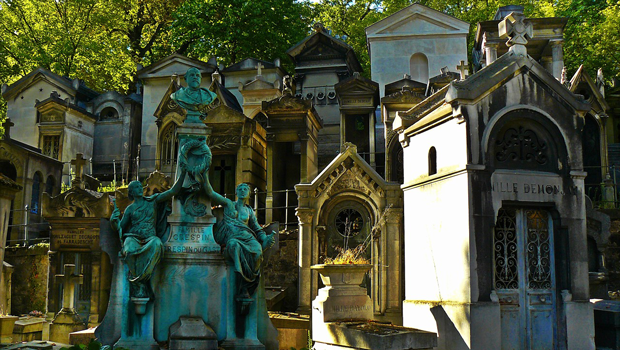French startups take on funeral industry
FRANCE – How a growing number of startups are challenging the country’s traditional funeral industry.
France’s treatment of its dead is a major tourist draw: from the artfully designed crypts and sprawling cemeteries holding the bones of Voltaire, Oscar Wilde and Jean-Paul Sartre, to the millions of carefully arranged bones that line the Paris catacombs.
But much like the rest of the world, the French undertaking business has historically been a grimly predictable one: people are born, people die, people need to be buried. Typically, funeral service providers haven’t needed to invest in marketing or engage in price wars with competitors. This has proved good business, with the price of funeral services jumping 50% in the last ten years and the average cost of a burial climbing to €3,350 ($3,700). (The US and UK have seen similar climbs, with average funerals soaring to $7,180 and $5,400 respectively.)
This status quo is now being challenged by a number of French startups hoping to dig into the estimated €2.3 billion ($2.6 billion) in revenue generated annually from funeral services, from a site that offers Yelp-like reviews of undertakers, to another supporting funeral crowdfunding. Even the city of Paris is participating—launching an independent service in recent years to help people organize low-cost funerals online. These sites are breathing energy into the funeral industry, by making it easier to compare products, and creating a demand for new services not provided by traditional funeral homes.
Sites like Simplifia, a startup founded by two business school graduates in 2011 that allows users to review and rank French undertakers “bring transparency, which will force undertakers to offer better quality,” says co-founder Maxime Nory. Simplifia also allows users to share death announcements by email, text or on social media.
Charles Simpson is the founder of Senior Media, which since 2010 has launched several death-related websites including Meilleures Pompes Funèbres, which ranks French undertakers according to user reviews, similar to Simplifia, and Collect Funéraire, a crowdfunding site. The idea of using technology to invigorate an ancient industry like undertaking has proved popular for people “who are well connected and active online,” Simpson says.
At the end of January, Collecte Funéraire had hosted 82 successful crowdfunding campaigns for funerals since its launch in June last year, taking a 5% commission on donations towards the up to €8,000 charged by funeral homes for funerals. Simpson acknowledged that it would take time for crowdfunding to be more widespread. “It’s not surprising considering that this sector is very traditional,” he said. But organizing the financial aspect of a funeral online can help people overcome the feeling that money is a taboo topic when discussing funeral arrangements. “It’s easier to ask for money through a computer screen,” he said. “It’s also easier to donate when it takes only three clicks. Even for someone you didn’t know that well: people are willing to help.”
Marc Dourlent was experiencing financial difficulties when his mother died in December last year, and he struggled to imagine how he would pay the €7,000 he was quoted for her funeral. “Feelings are not low-cost,” says the 49-year-old Paris-based hospital administrator, and he did not want to cut corners. Seeking a solution, Dourlent Googled “low-priced funerals” and came across Révolutions Obsèques, an online service launched in 2012 by the City of Paris-owned Services Funéraires.
Révolutions Obsèques offers users a “burial kit” which helps them choose, order, and pay for a coffin, as well as arrange a ceremony, all online. Priced at a thousand euros, its funeral service is three times cheaper than that of a traditional undertaker. Dourlent learned through the service that he could cut costs by completing paperwork himself and asking family members to carry his mother’s coffin.
Dourlent ended up paying €2,400 for his mother’s funeral, with extra fees incurred from organizing the ceremony outside of Paris, and says he initially struggled with the fact that he had used a low-cost service. “You want the funerals to [reflect] the love you have for the person, he says, “But when you’re facing a difficult financial situation, you have to make choices.” Ultimately, he was glad for the option. “The service couldn’t have been better. They helped me a lot.”
Cendrine Chapel is the co-director of Services Funéraires in Paris, which was founded by the city of Paris in 1998 with a mandate to offer affordable funerals to Parisians. She says Révolution Obsèques has been able to keep costs low because they don’t have to work out of a traditional brick-and-mortar funeral home with multiple employees. A part-time employee helps Chapel organize on average 150 to 200 funerals a year and coordinating burials with hospitals, retirement home, cemeteries and religious organizations. That is as many as one of the network’s traditional funeral homes, Chapel said.
France’s treatment of its dead is a major tourist draw: from the artfully designed crypts and sprawling cemeteries holding the bones of Voltaire, Oscar Wilde and Jean-Paul Sartre, to the millions of carefully arranged bones that line the Paris catacombs.


Leave a Comment
You must be logged in to post a comment.